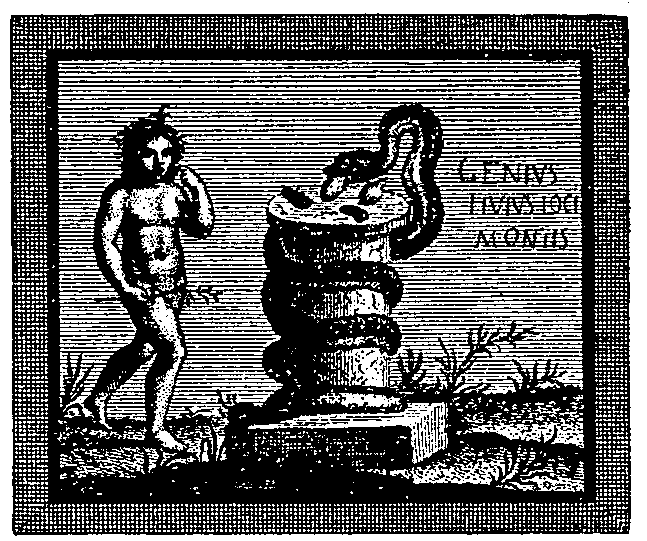|
Dictionary: Search the Dictionary Browse the Dictionary |
|
Timeline: Launch Interactive Timeline |
| Return to Front Page |
| GENIUS | |
| Form: =creator, begetter. | |
Deprecated: Function split() is deprecated in /www/www-ccat/data/classics/myth/php/tools/dictionary.php on line 64 The Italian peoples regarded the Genius as a higher power which creates and maintains life, assists at the begetting and birth of every individual man, determines his character, tries to influence his destiny for good, accompanies him through life as his tutelary spirit, and lives on in the Lares after his death. (See LARES.) As a creative principle, the Genius is attached strictly speaking, to the male sex only. In the case of women his place is taken by Juno, the personification of woman's life. Thus, in house inhabited by a man and his wife a Genius and a Juno are worshipped together. But in common parlance it was usual to speak of the Genius of a house, and to this Genius the marriage bed was sacred. A man's birthday was naturally the holiday of his attendant Genius, to whom he offered incense, wine, garlands, cakes, everything in short but bloody sacrifices, and in whose honour he gave himself up to pleasure and enjoyment. For the Genius wishes a man to have pleasure in the life he has given him. And so the Romans spoke of enjoying oneself as indulging one's Genius, and of renunciation as spiting him. Men swore by their Genius as by their higher self, and by the Genius of persons whom they loved and honoured. The philosophers originated the idea of a man having two Genii, a good and a bad one; but in the popular belief the notion of the Genius was that of a good and beneficent being. Families, societies, cities and peoples had their Genius as well as individuals. The Genius of the Roman people (Genius Publicus, or Populi Romani) stood in the forum, represented in the form of a bearded man crowned with a diadem, a cornucopia in his right hand, and a sceptre in his left. An annual sacrifice was offered to him on the 9th October. Under the Empire the Genius of Augustus, the founder of the Empire, and of the reigning emperor, were publicly worshipped at the same time. Localities also, such as open spaces, streets, baths, and theatres, had their own Genii. These were usually represented under the form of snakes (see cut); and hence the common habit of keeping tame snakes. |
|
|
|
|
| Pictures and Media | |
| HARPOCHATES, AND SNAKE AS GENIUS LOCI. (Pillure d' Evcoluno, i 207.) |

|
|
Copyright 2000-2020 Peter T. Struck. No portion of this site may be copied or reproduced, electronically or otherwise, without the expressed, written consent of the author. |